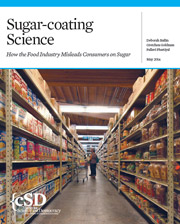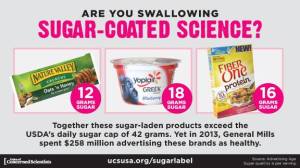 The food industry uses misleading marketing and industry-supported interest groups to obscure the health consequences of added sugar in their products, according to a new report, Sugar-Coating Science: How the Food Industry Misleads Consumers on Sugar, from the Center for Science and Democracy at the Union of Concerned Scientists.
The food industry uses misleading marketing and industry-supported interest groups to obscure the health consequences of added sugar in their products, according to a new report, Sugar-Coating Science: How the Food Industry Misleads Consumers on Sugar, from the Center for Science and Democracy at the Union of Concerned Scientists.
“Companies are going out of their way to promote products with added sugar in them as healthier than they really are,” said Deborah Bailin, lead author. “In many cases, they’re adding sugar to otherwise healthy foods and misleading customers about it. It’s not just soda and snacks, either. Added sugar is in everything from bread to salad dressing and even frozen dinners.”
Medical researchers have linked sugar overconsumption to diabetes, cardiovascular disease, and hypertension. Despite these dangers, companies advertise products with added sugar using healthy-sounding language. For instance, Apple Cinnamon Cheerios are marketed as “whole grain,” which they are, but the product also contains 10 grams of sugar—10 times the amount in General Mills’ regular Cheerios.
Since 1970, average daily U.S. sugar consumption has increased from 74.7 grams to 82.1 grams (20 teaspoons). That is more than double the U.S. Department of Agriculture’s dietary guideline recommendation of no more than 42 grams of sugar a day. The report documents that eating just a few sugar-added products during the day could easily cause someone to exceed the recommendation level.
The food industry spends nearly $7 billion annually advertising its products. About a quarter of its spending is directed at youth advertising and sugar-heavy products make up the bulk of that spending. GoGurt yogurt, for instance, contains large amounts of added sugar, but has been advertised as healthy because it is free of “high fructose corn syrup.” The report also tracks misleading marketing campaigns for sugar-added products that have been specifically directed at women, minorities and low-income consumers.
Food industry-supported interest groups also play a significant role in misinforming the public, the report finds. Court documents recently revealed that the Corn Refiners Association (CRA) paid Berman and Company to run a misleading ad campaign through the Center for Consumer Freedom, a nonprofit run by Berman and Company’s founder. The ads conveyed the message that all sugars—whether from corn, cane, and beets—are “natural” and pose no health concerns. This message is misleading, the report says, because it distracts people from the risks associated with over-consuming sugar in any form. In internal emails, CRA’s then-president Audrae Erickson counseled colleagues to deny that CRA was financing the campaign.
The report makes the following recommendations in order to hold the food industry and its interest groups accountable for their efforts to obscure the science on sugar and its detrimental health effects:
- The media should publicly call out sugar interests’ misstatements.
- Scientific experts should disclose all real or perceived conflicts of interest.
- Investors and citizens should pressure companies to align their public messaging with science and to cease funding to trade and front groups that spread misinformation.
- U.S. Congress should restore the Federal Trade Commission and Federal Communications Commission to their full capacity to regulate marketing to children so that the agencies can regulate youth-targeted marketing.
- The U.S. Food and Drug Administration should implement a strong rule requiring the labeling of added sugar in nutrition labels as the agency announced it intends to do.
- Federal, state, and local health agencies should develop aggressive public information campaigns to emphasize the scientific evidence demonstrating sugar’s health impacts and counter the misinformation from sugar interests.
The report is being released at the Science, Democracy, and a Healthy Food Policy forum on integrating public health science into U.S. food policy, sponsored by Union of Concerned Scientists and the University of Minnesota’s School of Public Health.
Citation:
1. Bailin D, Goldman G, Phartiyal P. Sugar-Coating Science: How the Food Industry Misleads Consumers on Sugar. Cambridge, Mass.: Union of Concerned Scientists, 2014.



